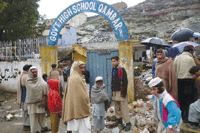“They (Taliban) are savages and we’re like a helpless herd, with no one to protect us,” says Sikander Ali, father of four girls, speaking to IRIN (Integrated Regional Information Networks) over the phone from Pakistan’s Swat valley. Ali was reacting to news that militants had ordered a ban on girls’ education from January 15. Swat valley (in the North West Frontier Province), which has a population of 1.8 million and lies some 15 km north east of Peshawar, is a hotbed of Islamist militancy for the past two years.
 Ali, a government official, had heard the recent warning by Shah Dauran, deputy leader of the Tehrik-e-Taliban Pakistan (TTP), on a clandestine FM radio station. “He said we must take our daughters out of all schools — private or public — by January 15, at the latest. Failing this, he said the schools will be bombed and violators would face death. He also said they will throw acid into the faces of our daughters if we don’t comply, like their counterparts did in Afghanistan some months back.”
Ali, a government official, had heard the recent warning by Shah Dauran, deputy leader of the Tehrik-e-Taliban Pakistan (TTP), on a clandestine FM radio station. “He said we must take our daughters out of all schools — private or public — by January 15, at the latest. Failing this, he said the schools will be bombed and violators would face death. He also said they will throw acid into the faces of our daughters if we don’t comply, like their counterparts did in Afghanistan some months back.”
The TTP’s warning isn’t being taken lightly. “It is feared that the extremists will carry out their threats,” says Ibrash Pasha, provincial coordinator of the Pakistan Coalition for Education (PCE). If this happens, an estimated 40,000 girls will be kept out of school. For now the schools are on winter vacation until February.
However, following the TTP threats, the private school Ali’s daughter goes to has re-opened and resumed classes for class XII “so that they can complete as much coursework as they can by January 15, as they have to sit for their board examination in April,” says Ali.
Meanwhile following heavy criticism, TTP leaders are toning down their rhetoric. “We have nothing against girls going to school,” says Muslim Khan, a spokesman of the TTP, speaking to IRIN from an undisclosed location in Swat. “What we are saying is that the education being given to our daughters in these schools is Western and not in keeping with the teachings of Islam. It is only making us wayward,” says Khan, who studied till class XII and confesses to having no Koranic teaching.
Since then an appeal by the Private School Owners’ Association appeared in local newspaper Shumaal on December 29, asking the TTP to reconsider its ban. It said the association had in the past always cooperated with all the demands of the TTP regarding purdah. It has segregated male and female students, changed boys uniforms from trousers and shirt to salwar kameez, and made changes in the curriculum in keeping with Islamic teachings. “Convincing parents to send their children, especially the girl child, to school was already an uphill task. Years of hard work put into mobilising rural communities to educate their girls has come to nought. This fear will give them an excuse to keep their girls at home, or make them work in the fields or for cattle-rearing,” says PCE’s Pasha.
Meanwhile according to Ali, the whole community is scared stiff. “They just kill you on the slightest pretext, and make an example of you. No one dares disobey them,” he says adding that neither the police nor the army intervenes or protects them.
Herald, a monthly newsmagazine, reported in August 2008 that there were 566 girls’ schools in Swat, including four government higher secondary schools, 22 high schools, 51 middle schools and 489 primary schools. Of these, 131 have either been set alight or closed, rendering 17,200 girls school-less.
(Excerpted and adapted from www.irinnews.org)